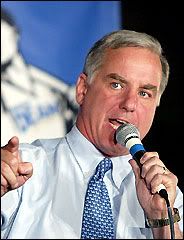|
| ALITO |
| Monday, October 31, 2005 |
| Conservatives who piled on President Bush's choice of Harriet Miers for the Supreme Court will likely be as cheerful over his new nominee as they were dispirited over the Miers nomination. The only thing that could make it better is if Democrats follow through on Sen. Harry Ried's threat that the selection of Samuel Alito would "create a lot of problems." Bring it on Harry.
Apparently, the President has decided that he's ready for a fight after all. He'd better be. A good fight with, and victory over, Democrats in Congress is the only thing that can save his presidency.
The initial word on Alito is that he is a clone of Antonin Scalia - only kinder and gentler. The Associated Press reported today, "So consistently conservative, Alito has been dubbed 'Scalito'; or 'Scalia-lite' by some lawyers because his judicial philosophy invites comparisons to conservative Supreme Court Justice Antonin Scalia. But while Scalia is outspoken and is known to badger lawyers, Alito is polite, reserved and even-tempered."
Alito, from the 3rd Circuit U.S. Appeals Court, is famous (or infamous, depending on who's reviewing his record) for being the lone dissenter on a case in the early 1990s (Planned Parenthood v. Casey) in which the 3rd Circuit struck down a Pennsylvania law that would have required women seeking abortions to notify their spouses.
Alito wrote, "The Pennsylvania legislature could have rationally believed that some married women are initially inclined to obtain an abortion without their husbands' knowledge because of perceived problems - such as economic constraints, future plans or the husbands' previously expressed opposition - that may be obviated by discussion prior to the abortion."
The case ended up at the Supreme Court, which struck down the spousal notification provision of the law. Chief Justice William H. Rehnquist dissented from the 6-3 majority, and cited Alito's reasoning in his dissent.
There are two ways this nomination could go. Democrats could back down and allow Alito to be confirmed with some saber rattling, but no action.
Or, they could try to launch a filibuster, which would test the "Gang of 14" deal. If the Democrat half of the gang agrees to help the home team instead of the gang, then Senate Majority Leader Bill Frist will have to decide whether to invoke the so-called "nuclear" or "constitutional" option, and the Republican half of the gang will be tested.
One way or the other, I believe the chances are better than not that Alito will be confirmed. Confirming him without a major fight would get much of Bush's base off his back. Confirming him with a fight would not only get them off his back, but would re-energize them and make it possible that he can do more than just tread water for the rest of his presidency. |
posted by Jack Mercer @ 10/31/2005 06:35:00 AM   |
|
|
|
| BUSH - INTERESTING POST |
| Thursday, October 20, 2005 |
| REPUBLICANS PREPARE FOR LIFE AFTER BUSH.Beached Partyby Ryan Lizza
date 10.20.05 Issue date 10.31.05
That was fast. Last month, George W. Bush was the leader of the conservative movement. This month, he's a traitor. "I don't think that Bush was ever one of us," says Bruce Bartlett, the conservative columnist and former Reagan and Bush 41 official. "And conservatives knew that. He was the anointed one. You can tell if someone is really part of your movement or not or whether he's someone from the outside. He's never said or written anything that would lead one to believe he has any clue what movement conservatism is all about. You were stuck with what you had, and I think conservatives made the best of it."
Bartlett, who is writing a book about Bush's betrayal of conservatives, was a critic before it became cool. Now, of course, his bandwagon is getting very crowded. "Bush was not the second coming of Ronald Reagan," says former Bush speechwriter David Frum, whose memoir about serving the president is called The Right Man but who is now one of the rebel leaders of the anti-Harriet Miers campaign. "He was a new thing. Every conservative knew he was a blend and was going to reach out to new constituencies. What the old coalition was going to get was a tax cut and judges. ... But the tax cut has turned out not to be a very valuable thing. Because of the deficits, this tax cut is not going to be permanent. Now here [with Miers] is the other most important thing he was going to do for conservatives, and he didn't do it."
To be sure, the conservative abandonment of Bush isn't total. The right is divided. Some see the split as one of Washington eggheads versus the red-state masses. Others, noting that the debate over Miers is, at its core, about abortion, interpret the current anger as a revolt by social conservatives. But neither of these explanations quite captures what is going on. The conservative war over Miers is being fought by elites on both sides. The pro-Miers elites are just doing a better job of wrapping their cause in populism. Meanwhile, members of the Republican clerical establishment can be found both criticizing the Miers pick (Gary Bauer) and defending it (Pat Robertson).
The best explanation of the two warring tribes comes from Marshall Wittmann. Having bounced from the Christian Coalition to John McCain's staff to the Democratic Leadership Council in the last decade, he has earned a reputation as Washington's shrewdest conservatologist. The Moose, as he likes to be called, is giddy about the conservative crack-up, and he thinks he has identified the fault line: "This is intra-conservative warfare between the faith-based conservatives and the reality-based conservatives." And, by "faith," he means not faith in God, but faith in Bush. In other words, the real split over Miers is between conservatives who worship Bush and those who worship conservatism. One camp believes in the infallibility of the president. The other camp believes the evidence before them. Fred Barnes and James Dobson are faith-based conservatives. Bill Kristol and Gary Bauer are reality-based conservatives. Hugh Hewitt is faith-based. Ramesh Ponnuru is reality-based.
Bush has more than three years left in office, and he will certainly make decisions that the right will cheer. But the scars from the Miers pick are unlikely to heal fully. A bond has been broken. Psychologically, conservatives are now looking beyond this president. Writing Monday in The New York Times, the National Review's Ponnuru all but declared the Bush era over: Conservatives are "thinking more and more about life after President Bush." And, as The New Republic goes to press, the conventional wisdom in Washington is that the Valerie Plame leak scandal is about to engulf the White House. "If there are indictments," says a GOP lobbyist, "and the basis of those indictments is that they didn't tell the truth about the war, people will want to change the channel, and they will be looking for new leadership. The next three years will be dismissed." Adds Wittmann, "If [U.S. Attorney Patrick] Fitzgerald comes down with something that strikes the White House, all bets are off with conservatism. It's the post-Bush era." The question for conservatives is what comes next.
As conservatives tell it, the current insurrection has been building for some time. Bartlett, the mainstream conservative who has written and thought the most about Bush's disloyalty, tells the tale this way. In 2001, conservatives were deeply frustrated by low-level Bush heresies like the education bill. Then, September 11 silenced all dissent. In 2002, things got worse: An enormous agriculture bill, steel tariffs, a bloated budget, and a campaign finance bill that Bush once argued was unconstitutional. (Bartlett goes so far as to say Bush "violated his oath of office" by signing it.) Then, the Iraq war silenced all dissent. Next came the Medicare prescription-drug bill, which simultaneously funneled money to the pharmaceutical industry, expanded government more than any entitlement since LBJ, and violated the traditions, if not rules, of the House when the vote on the bill was held open for nearly three hours while conservative Republicans were bullied into reversing their no votes. "From my own point of view, the drug bill was the line in the sand," says Bartlett. "That's the point I decided to write a book and say this guy isn't one of us." Other conservatives were also very angry. Then, the presidential campaign against John Kerry silenced all dissent.
We know the rest of the story: Absent a new war or domestic enemy like Kerry, Bush was suddenly exposed to the whole world, including the conservative movement, as a less-than-great president. Social Security reform fizzled. Bush signed an outrageously pork-laden transportation bill. He vacationed while New Orleans drowned. "What a lot of conservatives have always believed is that at least we know how to make the trains run," says a chastened Bartlett. "It was jarring that the MBA president wasn't a good manager." And then it was even more jarring that he wasn't such a good picker of Supreme Court justices, either. "Judges in the mold of Scalia and Thomas were the 'no new taxes' pledge of this presidency," says Frum. Scales fell from eyes, and the rebellion began.
Conservatives are now looking ahead. Frum is writing a book about the future of the movement. Republicans are jittery that Bush will be a liability for them in 2006. And the 2008 presidential candidates are suddenly beginning to carve out identities that distinguish them from Bush. Since the president has no clear successor, the Republican primaries will be more open and dynamic than they have been in decades. "Eight or ten months ago, it looked like the 2008 nominee would be the person who could convince primary voters he was most like George W. Bush," says California Republican strategist Dan Schnur. "That's not the case anymore." Numerous interviews with Republicans across the ideological spectrum reveal three camps jockeying to define the post-Bush era.
Reformers
There are two strains of reform conservatism bubbling in GOP circles. They look nothing like each other, but either one might find fertile ground if the Republican status quo is truly upended.
The brand of reform that is most clearly ascendant is John McCain's. "Chaos is our friend" is a saying often used by McCain advisers, and they are right. Although the Arizona senator can't explicitly take advantage of the unrest over Miers, given that he supports her nomination, he benefits from GOP anger at the president. Conservative disillusionment with Bush is giving McCain a second chance with parts of the base that previously shunned him--a chance he's well-positioned to exploit. Even before the Miers split, he alone in the GOP carried the mantle of fiscal restraint. He voted against Bush's Medicare and highway bills and has now joined hands with conservatives in the House to try to cut spending. Meanwhile, McCain's allies have been quietly reaching out to social conservatives. They hold regular conference calls with Republican leaders in South Carolina, the senator's Waterloo in 2000. McCain (shamefully) has even endorsed the teaching of "intelligent design" in schools.
Not only is McCain taking advantage of the ideological fissures on the right, but he is one of the few Republicans who could actually benefit from the scandals threatening to bring down his party. The McCainiacs have been the loudest voices in GOP politics decrying the Jack Abramoff-style corruption that has infested Washington. (McCain himself, to the chagrin of many conservatives, is leading the Senate investigation of Abramoff.) If the Bush collapse is accompanied by major Republican defeats in 2006 ("How sobering will that be to the party?" says a McCain adviser), McCain is poised to be the chief beneficiary on the right.
The other interesting reform advice Republicans are getting these days comes from, of all people, Newt Gingrich. The former House speaker has spent his years in exile thinking deeply about the future of conservatism. He has a website, newt.org. He lectures widely. He sends Republicans long white papers about how to repair the party. In the middle of the White House meltdown, he popped up on television to offer his views. And, yes, he's thinking about running for president.
Gingrich has been puzzling over conservatism's central dilemma: How does it transform its guiding ethos from that of an opposition movement, which it once was, to that of a governing majority, which it now is? "We are confronting a decision," he wrote recently, "which will largely decide whether conservatism is a temporarily successful movement doomed to retreat into minority status again or is a governing movement that is capable of solving problems and governing on behalf of the American people for a generation or more."
Gingrich happens to be pro-Miers, but the party's recent misfortunes have many conservatives listening to his advice, which, read closely, is actually a searing critique of Bush's leadership. His main idea is that conservatives need to figure out the proper "governing style and governing tone." The most successful leaders, he argues, "have always emphasized the nation and sought to include their opponents." He believes the country wants the GOP to "campaign less and govern more." Gingrich has become, in effect, a champion of the goo-goo idea that politics has become too polarized and too partisan. (Yes, this is the same Newt Gingrich.) "While [long-term governing majorities] always stay close to their base," he wrote, "they do not allow their base to limit either their appeal or their reach. While they are always solid partisans, they offer visions and principles that reach far beyond their partisan supporters." Successful leaders also have an "inclusive approach and a problem solving tone" and will not "divide the country unnecessarily." They also "evolve and change" when circumstances do; "rethink and change ... policies" and "personnel"; eschew appeals for support based strictly on "loyalty"; and are "determined but not stubborn." In other words, to be successful, the next Republican leader must govern in a manner exactly the opposite from Bush.
But, while some Republicans may like the critique of Bush's style, the policy implications of Gingrich's advice would seem to be the reverse of what the right wants. Gingrich calls for leadership that is depolarizing and apolitical. Like McCain, he's calling for the party to emphasize the national interest over the narrow interests of its most ardent supporters. The problem is that many conservatives are now hungry for purity. Bush has ironically pushed away both sides in this debate: He has governed as a partisan, alienating more than half the electorate; yet, in the end, he failed to satisfy his own base. |
posted by Jack Mercer @ 10/20/2005 09:02:00 PM   |
|
|
|
| AMERICAN CONSERVATISM |
| Monday, October 17, 2005 |
| OpinionJournal - AMERICAN CONSERVATISM
Holding Court
There's a crackdown over Miers, not a "crackup."
BY RUSH LIMBAUGH
Monday, October 17, 2005 12:01 a.m.
I love being a conservative. We conservatives are proud of our philosophy. Unlike our liberal friends, who are constantly looking for new words to conceal their true beliefs and are in a perpetual state of reinvention, we conservatives are unapologetic about our ideals. We are confident in our principles and energetic about openly advancing them. We believe in individual liberty, limited government, capitalism, the rule of law, faith, a color-blind society and national security. We support school choice, enterprise zones, tax cuts, welfare reform, faith-based initiatives, political speech, homeowner rights and the war on terrorism. And at our core we embrace and celebrate the most magnificent governing document ever ratified by any nation--the U.S. Constitution. Along with the Declaration of Independence, which recognizes our God-given natural right to be free, it is the foundation on which our government is built and has enabled us to flourish as a people.
We conservatives are never stronger than when we are advancing our principles. And that's the nature of our current debate over the nomination of Harriet Miers. Will she respect the Constitution? Will she be an originalist who will accept the limited role of the judiciary to interpret and uphold it, and leave the elected branches--we, the people--to set public policy? Given the extraordinary power the Supreme Court has seized from the representative parts of our government, this is no small matter. Roe v. Wade is a primary example of judicial activism. Regardless of one's position on abortion, seven unelected and unaccountable justices simply did not have the constitutional authority to impose their pro-abortion views on the nation. The Constitution empowers the people, through their elected representatives in Congress or the state legislatures, to make this decision.
Abortion is only one of countless areas in which a mere nine lawyers in robes have imposed their personal policy preferences on the rest of us. The court has conferred due process rights on terrorists detained at Guantanamo Bay and benefits on illegal immigrants. It has ruled that animated cyberspace child pornography is protected speech, but certain broadcast ads aired before elections are illegal; it has held that the Ten Commandments can't be displayed in a public building, but they can be displayed outside a public building; and the court has invented rationales to skirt the Constitution, such as using foreign law to strike down juvenile death penalty statutes in over a dozen states.
For decades conservatives have considered judicial abuse a direct threat to our Constitution and our form of government. The framers didn't create a judicial oligarchy. They created a representative republic. Our opposition to judicial activism runs deep. We've witnessed too many occasions where Republican presidents have nominated the wrong candidates to the court, and we want more assurances this time--some proof. The left, on the other hand, sees the courts as the only way to advance their big-government agenda. They can't win national elections if they're open about their agenda. So, they seek to impose their policies by judicial fiat. It's time to call them on it. And that's what many of us had hoped and expected when the president made his nomination.
Some liberal commentators mistakenly view the passionate debate among conservatives over the Miers nomination as a "crackup" on the right. They are giddy about "splits" in the conservative base of the GOP. They are predicting doom for the rest of the president's term and gloom for Republican electoral chances in 2006. As usual, liberals don't understand conservatives and never will.
The Miers nomination shows the strength of the conservative movement. This is no "crackup." It's a crackdown. We conservatives are unified in our objectives. And we are organized to advance them. The purpose of the Miers debate is to ensure that we are doing the very best we can to move the nation in the right direction. And when all is said and done, we will be even stronger and more focused on our agenda and defeating those who obstruct it, just in time for 2006 and 2008. Lest anyone forget, for several years before the 1980 election, we had knockdown battles within the GOP. The result: Ronald Reagan won two massive landslides.
The real crackup has already occurred--on the left! The Democratic Party has been hijacked by 1960s retreads like Howard Dean; billionaire eccentrics like George Soros; and leftwing computer geeks like Moveon.org. It nominated John Kerry, a notorious Vietnam-era antiwar activist, as its presidential standard-bearer. Its major spokesmen are old extremists like Ted Kennedy and new propagandists like Michael Moore. Its great presidential hope is one of the most divisive figures in U.S. politics, Hillary Clinton. And its favorite son is an impeached, disbarred, held-in-contempt ex-president, Bill Clinton.
The Democratic Party today is split over the war and a host of cultural issues, such as same-sex marriage and partial birth abortion. It wants to raise taxes, but dares not say so. It can't decide what message to convey to the American people or how to convey it. And even its once- reliable allies in the big media aren't as influential in promoting the party and its agenda as they were in the past. The new media--talk radio, the Internet and cable TV--not only have a growing following, but have helped expose the bias and falsehoods of the big-media, e.g., Dan Rather, CBS News and the forged National Guard documents. Hence, circulation and audience is down, and dropping.
The American left is stuck trying to repeat the history of its presumed glory years. They hope people will see Iraq as Vietnam, the entirety of the Bush administration as Watergate and Hurricane Katrina as the Great Depression. Beyond looking to the past for their salvation, the problem is that they continue to deceive even themselves. None of their comparisons are true. Meanwhile, we conservatives will continue to focus on making history.
|
posted by Jack Mercer @ 10/17/2005 09:23:00 PM   |
|
|
|
| Townhall.com :: Columns :: Does this law degree make my resume look fat? by Ann Coulter |
| Sunday, October 16, 2005 |
| Townhall.com :: Columns :: Does this law degree make my resume look fat? by Ann Coulter
Supreme Court nomination may not have been the ideal time for Laura Bush to start acting like "Buy One, Get One Free" Hillary Clinton. At least President Clinton only allowed his wife to choose the attorney general. (Remember the good old days when first ladies only got to pick the poet laureate and the White House china pattern?)
Between cooking segments on the "Today" show this week, Laura rolled out the straw man – sorry, "straw person" – argument that the criticism of Miers was rooted in "sexism" (which is such a chick thing to say).
I'm a gyno-American, and I strenuously object.
The only sexism involved in the Miers nomination is the administration's claim that once they decided they wanted a woman, Miers was the best they could do. Let me just say, if the top male lawyer in the country is John Roberts and the top female lawyer is Harriet Miers, we may as well stop allowing girls to go to law school.
|
posted by Jack Mercer @ 10/16/2005 07:46:00 PM   |
|
|
|
| Liberals - The New Fundamentalists. |
| Friday, October 14, 2005 |
I remember sitting in a tent revival meeting as a child and asking my father about the speaker "Is he mad, Daddy? Who is he angry at?" Over the years, the more I ran into fundamentalists and their often
concrete thought I was struck by their aura of anger and omnipresent sense of defeatism.
___________________________________________________
Fire raining down from the heavens, an evil lord and his corrupt legions overrunning the earth, unchecked unrighteousness, doom, judgment...

Fast forwarding to 2005, no, you aren't sitting in a fire-breathing fundamental Chruch of God, you are at your average every-day neighborhood liberal get-together. Whether it is Al Gore, red-faced, white shirt dripping with sweat, challenging the powers of darkness or Howard Dean running up and down the aisles being "slain in the spirit", the old southern circuit ridin' evangelist seems to have been reborn in America's liberal leaders.

The dogma presented is just as concrete and faith-based. There are deities and demons. Worshipped are the gods of environmentalism, entitlement and pacifism while they battle the devils of "big business", conservatism, and often plain reason. The feeling of righteousness and moral superiority is palpable.

The congregation is caught up in the religious fervor, hanging with rapture on the words coming from the pultpit, accepting it as gospel, pure and righteous. Then, each one, fancying themself a crusader of light, goes forth throughout the week to spread the good news to every creature. Stopping you in the hall, they witness to you in the most sincere way, sharing the light through their internet portals, congregating with each other for mutual edification. One day, one may even open one's front door to two such acolytes, "Elder Such-and-such" on button one, "Disciple This-and-that", on the other, a copy of "My Life" (written by patron-saint Bill Clinton) tucked under respectful arms.

Fundamentalism has its appeal. Requiring little thought, extreme faith, complete devotion, and unbridled passion. Anyone is capable. It's droning mantras intoned by high priests are repeated reverently over and over by the flock until it becomes truth--a world of foundational absolutes. There is no wonder it attracts so many.

Go ye into all the world, liberals, and preach the gospel. |
posted by Jack Mercer @ 10/14/2005 08:30:00 PM   |
|
|
|
|
| About Me |
|

Name: Jack Mercer
Home:
About Me:
See my complete profile
"Snipet" (pronounced: snipe - it) is not a word.It is a derivative of two words: "Snipe" and "Snippet".
Miriam Webster defines Snipe as: to aim a carping or snide attack, or: to shoot at exposed individuals (as of an enemy's forces) from a usually concealed point of vantage.
Miriam Webster defines Snippet as: : a small part, piece, or thing; especially : a brief quotable passage.
In short, "Snipets" are brief, snide shots at exposed situations from a concealed vantage point.
WARNING! With due reverence to the Bill of Rights and the First Amendment there is NO comment policy on the News Snipet.
|
| Other things |
| Archives |
|
|
| Politics |
|
| Template by |



|
|


